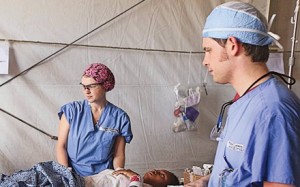What to do if you don’t get into medical school
From the 2011 Maclean’s Professional Schools Rankings
Share

Roughly three-quarters of medical school applicants are rejected each year. Bummer. Luckily for them, wannabe doctors have better alternatives than ever. These four professional health care programs can be completed in just a few years, are in high demand, and pay well directly out of school. That means graduates can start paying off their student loans while medical residents are still driving beat-up old cars to 24-hour shifts.
Health Care Manager
The Job: Health care managers work in hospitals, medical clinics and nursing homes where they direct teams of health care providers. Their job is to make sure patients get excellent care and, simultaneously, that Canadians get good value for the nearly $200 billion they spend on health care each year.

The Pay: It varies by title and location. In British Columbia, the range is $35,000 to $120,000. In Prince Edward Island, the range is $43,000 to $85,000. In Saskatchewan, it’s between $58,000 and $125,000.
The Programs: There are three accredited programs in Canada: the master of health administration at Dalhousie, the master of health sciences at the University of Toronto and the master in health services administration at Montréal.
Physician Assistant
The Job: Overseen by medical doctors, the physician assistant takes on the relatively easy diagnoses, procedures and tests, like sore throats and birth control pill renewals. That saves MDs for more complicated cases, which saves health care dollars. That’s why there are 70,000 PAs in the U.S. In Canada, there are 250 working in Ontario, Manitoba, New Brunswick and Alberta, but that number is increasing quickly.
The Pay: Starting salaries are between $75,000 and $85,000, but PAs make as much as $162,000.
The Programs: After two years of university, students can apply to the bachelor of health sciences at McMaster or the bachelor of science (physician assistant) offered by the Consortium of Physician Assistant Education in Ontario. The University of Manitoba’s master of physician assistant studies follows a four-year degree.
Global Health Expert
The Job: Global health experts work with one main goal in mind: a world where every human has access to quality health care, regardless of wealth. Some graduates work with NGOs like the Red Cross or World Vision. Others do health policy research for governments, at agencies like the Canadian Institute for Health Information or the World Health Organization. Some stay in academia. Many continue on to medical school.
The Pay: It varies by job title. Health policy researchers, consultants and program officers make $35,000 to $88,000 in Ontario and $29,000 to $87,000 in Vancouver.
The Programs: Alberta and McMaster both have master of science degrees in global health. Toronto and Simon Fraser have master of public health degrees with concentrations in global health.
Midwife
The Job: Midwives in Canada were counted in the dozens 20 years ago. But in 2010, an army of roughly 850 registered midwives helped 14,000 mothers and babies from gestation through the big push, and into the postpartum period. Midwives often enjoy more time with their patients than doctors can afford to spend.
The Pay: Midwives are often paid per patient by provincial insurance plans, just like doctors. Salaries range from $43,000 to $72,000 in Quebec to a high of $77,000 to $124,000 in British Columbia.
The Programs: Four-year bachelor of midwifery programs can be entered directly from high school at McMaster, Laurentian, Ryerson, Québec à Trois-Rivières, UBC, University College of the North and Mount Royal University.
Sources: Canadian Association of Midwives, Canadian Midwifery Regulators Association, Canadian Association of Physician Assistants, Commission on Accreditation of Healthcare Management Education and Statistics Canada.
This article originally appeared in the Maclean’s Professional Schools Rankings, on sale now.